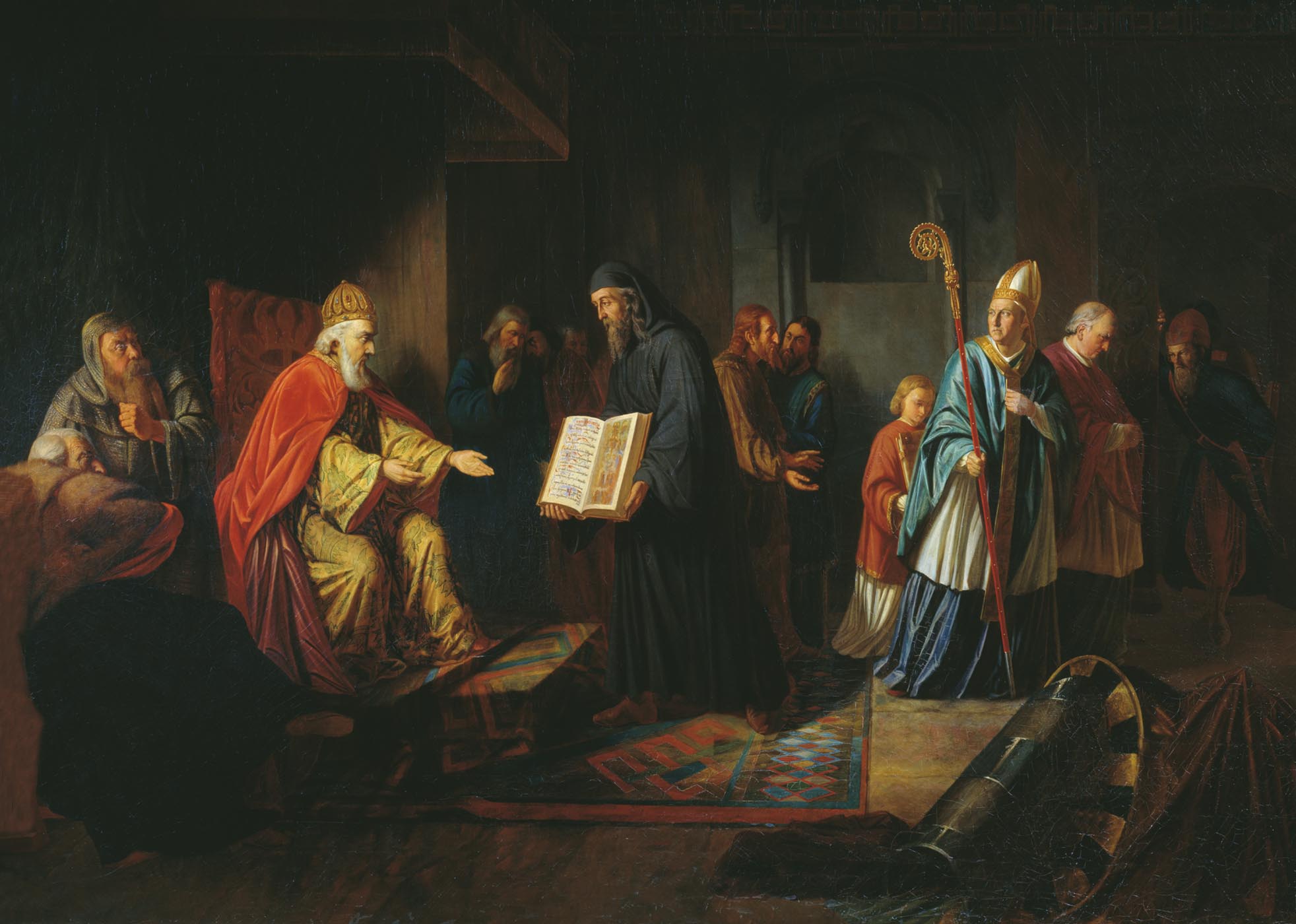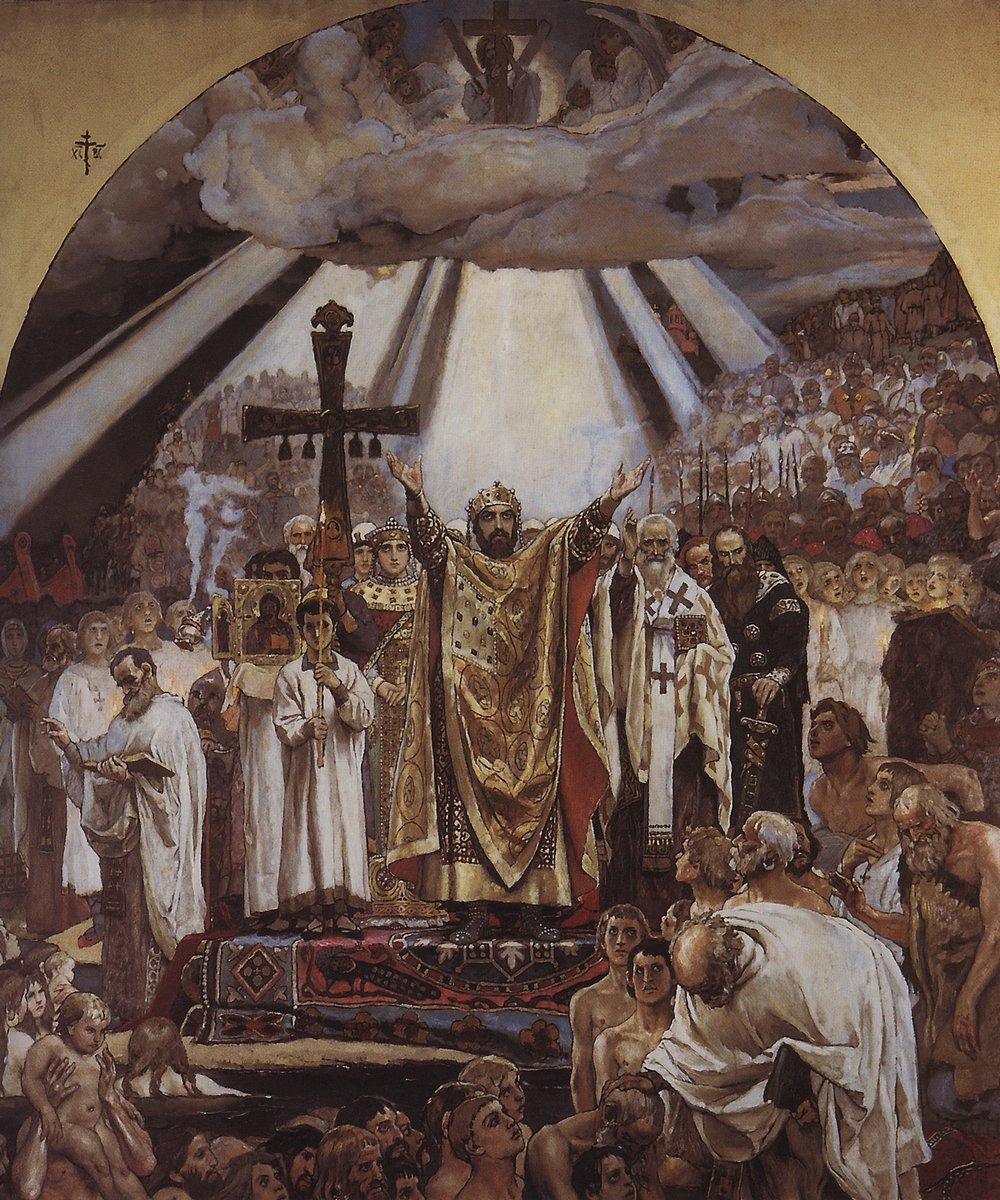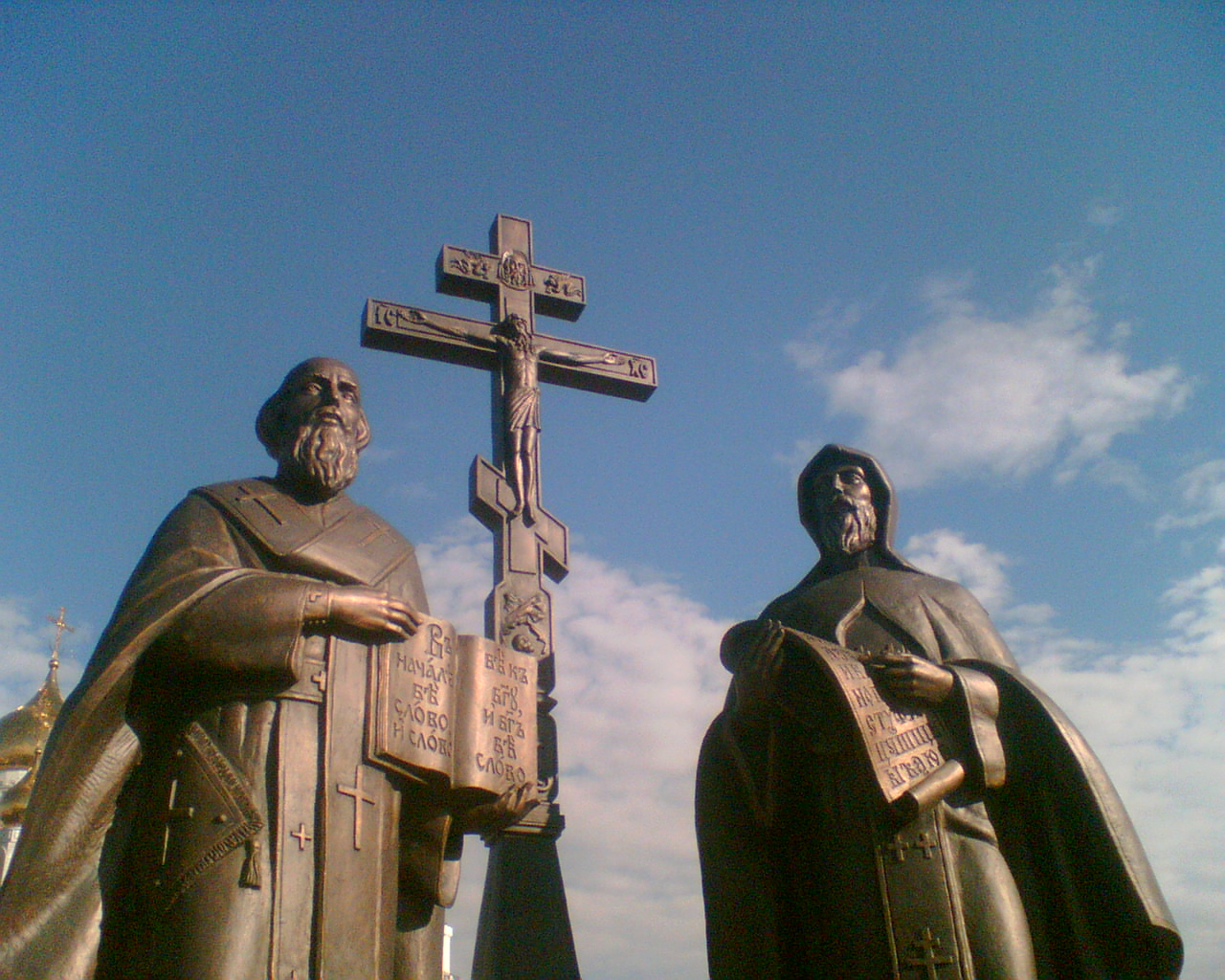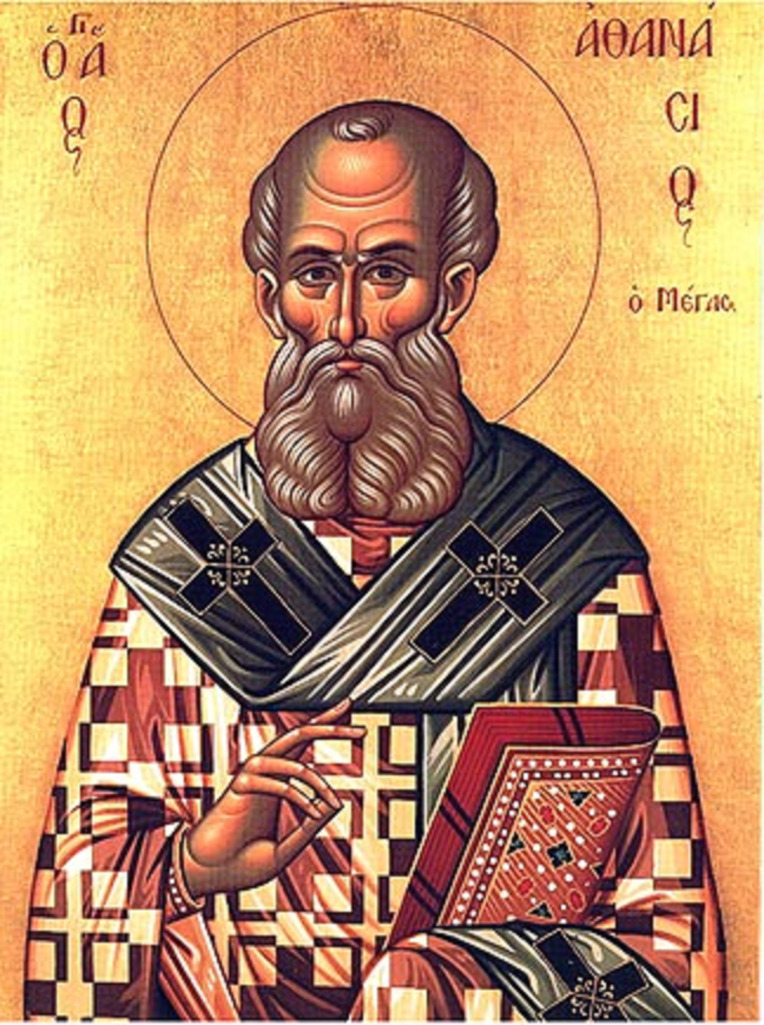The Christianisation of Rus’, which took place 1035 years ago, introduced it into a new, global world
Kirill Privalov
That meeting took place almost four decades ago, but I remember everything as if it were now.
“Good Lord, how it smells! How divine it smells!” Vera Lvovna held touchingly and carefully, like a baby or a precious pearl, a rye bread loaf brought to her from Moscow as a gift. An emigrant of the first, “white” generation of Russian refugees who settled near Paris, she could not fully enjoy the unique bitter and caramel aroma of Borodino bread.
The old woman (really, what a rude phrase!) pressed her lips to a ruddy, spicy rye loaf and, breaking off the crust, kissed it:
“I can hear Rus’, Holy Rus’!”
It is with this epithet that we often talk about Russia. This is not a figure of speech, but the essence of the primordial perception of the vast space inherited from our ancestors, and I emphasise that: only perception, without inner modus vivendi. And the lofty term “holiness” itself, as a general synonym for the purity of the spirit, soul and body and non-involvement in evil, is not the main thing here. For we are talking about holiness not in the sense of a state of being or our lifestyle, but about Christian, more precisely, Orthodox holiness. On the holiness of the Russian Faith.

“Modern history is the history of Christianity”, said Alexander Pushkin. He spoke primarily about culture, and Russian culture is Christian for the most part. I recall our long-standing conversation with Vasily Aksyonov back in Biarritz, France, before the writer returned from exile to Moscow. I asked Vasily Pavlovich in his cozy little house with the Basque name Arbola derra, why his American lectures were largely devoted to the Silver Age. Aksyonov replied: “The Silver Age was the apogee of Russian culture. The very one without which Russia would not have become one of the greatest political and economic powers in the world at the turn of the 19th and 20th centuries. The power of a country is measured by the potential of its creators. Not only scientists, inventors, rationalisers, but also, and first of all, intellectuals: writers, philosophers, composers … The deep culture of Russia is based on Christology. The Christianisation of the country became, in fact, the starting point of its observable history and introduced it into a new, global world.”
Frankly, I was surprised that this came from the man who was born in the USSR and was formed by Soviet society. No one would ever call a wonderful writer, as they say now, “churched.” No, the author of The Island of Crimea and Overstocked Packaging Barrels was a worthy representative of a completely secular era. And so the more valuable is the wisdom of Aksyonov, an outstanding thinker and patriot. For the year 988, when Rus’ was baptised officially (some researchers believe that it happened later, in 990 or even in 991), was the starting point for everything that we see around us today – it was the beginning of great beginnings.
When did Christianity come to the modern Russian territory? It is an ungrateful mission to answer this question, because with the development of science, new discoveries determine the first Christian churches in the country as being closer and closer to the Nativity of Christ in terms of the date of their establishment.
In Dagestani Derbent, the southernmost city of Russia, they discovered an underground structure, about the purpose of which the researchers put forward several versions at once. Experts considered that it could be both a huge water reservoir and an ancient temple of fire-worshipping Zoroastrians … All doubts disappeared when they obtained the results of muon radiography. It is made to detect muons passing through the walls; muons are charged particles arising from the interaction of primary cosmic rays with the nuclei in the Earth’s atmosphere. The experiment showed that the building was cross-shaped, and its walls were oriented to the cardinal points. The dome is located in the center of the cruciform structure. There is no doubt: the underground structure rather was a large Christian church of the time. And, as radiography shows, it was built around the year 300.
Yes, Christians lived on the territory of the Eastern Slavs and their neighbours as early as the Roman emperors. There is a legend about St. Andrew the First-Called, who went to carry Christ faith to Scythia – first to the Northern Black Sea region and then up the Dnieper. Allegedly, one of the twelve apostles of Jesus erected a cross on the hills on which Kiev later grew. These events decribed in the manner of Hollywood alternative history raise doubts even among the most zealous hagiographers … However, behind every myth there are, as you know, real facts which had been forgotten long ago.
Byzantium, fearing to have numerous tribes of warlike pagan barbarians near its borders, systematically sent missionaries to them. You will not envy the fate of some of them, including those who tried their luck at the time of the Roman Empire. The life of Clement, the fourth Pope of Rome, tells of the stay of this pontiff in hard labour in the Inkerman quarries near Chersonesus, where Clement died during the reign of Emperor Trajan, that is, at the turn of the first and second centuries after the Nativity of Christ. The pagan Romans tied Clement by the neck to an anchor and threw him into the Black Sea … Despite this, Christianity in the Crimea became such popular already in the 3rd century, that there was a need for their own bishop. At the historic First Ecumenical Council in Nicaea, Metropolitan Gotfil was present, who coordinated – pay attention! – the Taurida Episcopacy already established by the time. Representatives of the Bosporus (Kerch) and Chersonesus also put their signatures under the council resolutions.
However, in no case should one assume that the Eastern Slavs easily abandoned their pagan gods: Perun, Veles, Dazhbog … But the Byzantine missionaries were on the alert: sometimes they managed to convert Slavic nobles, commanders and even princes to Christianity. Where are specific evidences? They don’t really exist today … But there is a legend about the conversion of Askold and Dir, the boyars-retinues of the Novgorod prince Rurik, to Christianity around the year 860. But it is not clear who these characters were, who allegedly ruled in Kiev. However, in some sources, some church historians connect the so-called Christianisation of Rus’ by Photius with the era when Emperor Photius sent his bishop to the banks of the Dnieper. They call it the first, so to speak, pre-Vladimir Christianisation dotted in later annals. But was it real?
As Italians say, “Se non è vero, è ben trovato” (“Even if it is not true, it is a very good fabrication”). The first real rulers of Rus’, Oleg and Igor, were pagans. But the wife of Prince Igor, Princess Olga, became a Christian – this is an undoubted fact. One can argue that her spiritual choice was caused by political necessity and nothing more. But this is all ad marginem (“in the margins of the page”). It is much more important that the Slavic-Varangian Olga was baptised in 955 (according to Byzantine sources – in 957), and where – directly in Constantinople, the stay in which of the Russian princess was described in medieval official documents literally step by step.
It is characteristic that this visit of the ruler of the Rus, which lasted for more than a month on the banks of the Bosporus, took place after the victorious campaigns of the Kievan princes against Byzantium in 866, 907 and 941. Context is important. For these were not pirate raids in the manner of Scandinavian Viking robbers; all the campaigns of the Rus resulted in official agreements with Constantinople. So, Olga hoped to extract the maximum benefit from her trip to Tsargrad, not for herself personally, but for Rus’. Basil Constantine Porphyrogenitus did everything to impress the distinguished guest from the “wild lands” as much as possible. There was a “flying” throne of the emperor, and roaring mechanical lions beating their tails, and golden trees with singing birds of paradise …
However, Byzantine cunning tricks could not change Olga’s intentions. She came to Tsargrad to receive the sacrament of baptism aiming at not becoming the spiritual imperial “August wife”, but obtaining the high title of “daughter queen.” But Constantine Porphyrogenitus refused to place the royal crown on the forehead of their princess. Basil could not allow the ruler of Rus’ to be equated with himself, like God. He understood that the future Russian Church might further seek for its independence from Constantinople.
Olga faced an impossible challenge: to reunite the Russian Church with the Byzantine priesthood and at the same time prevent her country from becoming a political satellite and a cultural province of the Byzantine Empire. Looking down from his heavenly palace on the peoples neighbouring with his empire, Basil considered for them the fate of the Byzantine satellites, its protectorates. This is what happened to the Bulgarians, Hungarians, with the Lombards in Italy … The Kievan princess imagined the future of Rus’ in a different way.
The “Russian Archontissa” (as the Greeks called the princess) was baptised at Hagia Sophia, but did not want to obey those who saw themselves as “rulers of Europe and Asia.” Olga saw tomorrow’s Rus’ as a Christian country, but at the same time not at all implicitly dependent from the theocracy of Byzantium. Her arrogance turned young Svyatoslav from accepting Christ faith, while he visited Tsargrad together with his mother and was not even invited by the emperor to a farewell dinner organised for the intractable Rus. And the Rus, being humiliated, did not want to forget the offense. When Basil’s emissaries a few years later came to Kiev for support and asked for “warriors to help”, as stated in The Tale of Bygone Years, Olga refused to send her experienced fighters to save Constantinople once again from the Arabs.
Watching the endless intrigues of the “flabby, pampered Romans”, Svyatoslav remained a pagan, who, moreover, was denied the hand of a Byzantine Caesarean. Through the fault of swaggering Byzantium, the baptism of Rus’ was, in fact, delayed for three decades, until the coming to power of Svyatoslav’s son, Vladimir.
… Vladimir Svyatoslavovich has many synonyms in the Russian chronicles. He is called “blessed”, and “equal to the apostles”, and “great” … In a word: Beautiful Sun. And the Rurik dynasty is erected right up to the Roman emperor Augustus. As the ancients used to say: “Give to Caesar the things that are Caesar’s, and to God the things that are God’s!” Let us leave such historiographic exercises to specialists. But I am keenly interested in something completely different: why did Vladimir follow the precepts of his mighty grandmother, and what did his spiritual choice give first to multi-tribal Rus’ and then to all of multinational Russia?

The route “from the Varangians to the Greeks” remained one of the main trade and transport arteries of Europe until the 12th century. In the northern part of this route stood the largest city of Rus’, Novgorod, accessible to the cold seas, being rich and freedom-loving. The neighbouring Chud tribes – Finns, Estonians, Vepsians, Karelians – themselves participated in Slavic trade. Chud’s courtyards, guest houses for Finno-Ugric merchants existed both in Kiev and Novgorod. But closer to the south, where they had to drag ships on logs, it was necessary for all merchants from different tribes to unite their forces. Steppe nomads and villains of all stripes were just waiting for caravans with commodities to be within reach of them on land. The same faith for all, merchants and their guards, helped to better understand each other. Both in battle and in commerce. It only remained for the prince to choose the faith that suited him, as well as the whole of Rus’.
The compiler of The Tale of Bygone Years, a monk of the Kiev-Pechersk Lavra named Nestor, presents Vladimir as a “tester of faith.” Quite recently being an outspoken pagan, according to some sources, he even practiced human sacrifice, and he experienced a comedown from his father’s beliefs and was looking for a new religion for his people. In the annals, the moment of the choice by the ruler of Kiev among the Islam of the Volga Bulgars, the Judaism of the “rebellious Khazars” and the Christianity of the Greeks appears, in my opinion, superficially and unconvincingly. More importantly, paganism does not look like a religion. Actually, it was not. It was a chaotic collection of various beliefs and cults. It included parochial national features, but there was no ability to unite scattered and warring tribes. And prudently ambitious Vladimir, who came with a sword from Novgorod to Kiev, having become a Grand Duke, passionately longs to unite Rus’ with minimal losses. This call of his to the unity of all the peoples that make up the country, echoed throughout Russian history. It still sounds to this day.
The future nation was maturing from two sides: in Novgorod, open to the north and west, and Kiev facing the south. It was enough for Rus’ to stew in its own juice, it was vital for it to break out into the open board from its native forests and swamps. It required a vivid sense of time as a measure of history and a cultural factor – from Greek antiquity up to the New Rome of the Romans.
Vladimir, a brave warrior (not always lucky, I must say), a smart diplomat and an energetic creator, simply loved life itself in all its guises – more than power or women. And to increase the enjoyment of life, the prince wished to perceive the numerous neighbours of Rus’ not as “Germans” (originating from the word “dumb”, that is, not speaking an understandable language), potential enemies, but as, if not partners, then at least co-religionists. It was more reasonable to join a globally established, strong and actively spreading religion by agreement than to compete with it forcedly.
The rise of Kiev over the seemingly much more powerful Novgorod was largely due to the fact that Christianity came to Rus’ precisely from the south, from Tsargrad. Why not a convincing argument against the version of the Varangians as the shapers of our country, appearing in the Romanov era under the influence of Germanic families, which made up the Russian noble synod to a large extent? In fact, most likely, everything was exactly the opposite. For reference: the baptism of Scandinavia – Sweden and Norway – took place two centuries later than of Rus’. And this happened not without the influence of our ancestors, the Slavs-Varyags.

If Frank Charlemagne brings Christianity to Germany, beating up entire Saxonic tribes, Jesus faith is spreading quite peacefully in Rus’. The overthrow of Perun was not accompanied by mass repressions. With tears, the pagans lowered dilapidated wooden idols down the rivers, but they usually did not take up weapons. The only exception was Novgorod, where the captain of the thousand Ugonai rushed along the city wall shouting: “It is better to die than to give our gods a mockery.” And “the evil slaughter began”, as the Ipatiev Chronicle says. But the forces were unequal. The prince’s warriors quickly overcame the townspeople. Warriors have long sympathised with the “Byzantine faith”: “One God in heaven – one basil on earth!” And the Novgorod boyars, as practical businessmen, quickly realising with whom it would be more profitable for them to be, were baptised in unison. Vladimir, who at the time of his paganism was distinguished by cruelty, this time took pity on the disobedient. To the question of his comrades-in-arms from the inner circle, why he did not execute the rebels, he answered in a completely Christian way: “I am afraid of sin …”
Constantine the Great was baptised only on the verge of death, frightened by the piercing cold of non-existence. Vladimir went the other way: he has been changing throughout his life. He knew that, as not being pure in his soul, he had no right to purify others in a Christian way. He left the baptismal font as a new man and gave hope for renewal to his compatriots. As Scripture says, “For we are saved in hope.” Is this not true power?.. It also helped that, while peacefully entering the life traditions in Rus’, Christianity did not conflict with pagan rites, but simply absorbed them, adapted them to its own purpose. So, the Sun God day of the summer solstice turned into the feast of the Nativity of John the Baptist, and Triglav into the feast of the Holy Trinity, and the Slavs celebrated Maslenitsa and Easter under other names long before the adoption of Christianity. It did not turn into a dogma in Rus’, but gave people the ability to see a miracle in the dullness of everyday life, allowed them to gain hope for a better life. Even if a better life means afterlife!
Absolute values for Rus’ were formed only thanks to the commandments of Christ. With Jesus faith, the stereotypes of the primitive consciousness of the Rus were torn from top to bottom like the veil in the Temple at Jerusalem on the day of the Crucifixion. The world became extensional and boundless for the Rus. Another important historic event contributed to this too: the development of Slavic writing by Cyril and Methodius. The alphabet was born! Is it coincidence? Of course, not. Changes in Rus’ have been brewing for a long time, and now they had come. Rapidly, all at once. The feat of the Prelate Vladimir coincided with the gift to the Slavic world of the two great Thessalonica brothers (Solun is the Slavic name of Thessaloniki).
Athanasius of Alexandria, one of the great defenders of early Christianity, said: “God became man so that man might become God.” This is about Rus’, about Russia. Its conciliar nature is a unique phenomenon. In Russian Christianity, the individual is not suppressed, but devoid of egoism. It exists in the free spiritual unity of people, both in church life and in the secular community. For the mentality of the Russian people was born in the symbiosis of the Orthodox Church and the village community. In other languages, there is no analogue to the word “conciliarity”, because the phenomenon itself does not exist. As the remarkable Russian philosopher and theologian Vladimir Solovyov accurately formulated, “Catholicism is unity without freedom; Protestantism is freedom without unity; Orthodoxy is unity in freedom and freedom in unity.”

Christianity (Orthodoxy since 1054) and the Cyrillic alphabet are the two keys to access of our ancestors to the big world stage. And who owns the language, those control their people. “Our faith is not Greek, but Christian”, said Ivan the Terrible. And it must be admitted that even the reforms of Peter the Great, pro-Western in spirit, changed neither the essence of the Russian faith nor the Russian alphabet. However, is it really Russian? According to some reports, Vladimir was persuaded to be baptised by his Bulgarian wife (before baptism, the pagan Grand Duke had several hundred wives and concubines). She also suggested borrowing a cult language from the Bulgarians. On that basis, Russian national identity had formed. With the help of the systematised Bulgarian written language, the Russian path to great literature was shortened. At first, only to spiritual literature. In the very first century of Russian Christianity, such masterpieces as, say, Metropolitan Hilarion’s The Sermon on Law and Grace appeared. He presents Vladimir’s conversion to the true faith as a miracle. The Metropolitan of Kiev writes about Vladimir in the middle of the 11th century, that he did not see Christ, did not know either the law or the prophets, did not hear the apostolic sermon, did not see the miracles performed by the saints, but “without all these forerunners to Christ, only due to the good sense and smartness, he understood that there is only one God, the creator invisible and visible.”
While the character of a person is their destiny, then the character of a nation is the same. Christianity, with its cult of self-sacrifice, was sincerely, even sometimes frenetically, received by the Russians. Another thing is, whether such, often martyrdom, selflessness was always helpful and salutary for them? In any case, without Christianity brought by St. Vladimir (it is curious that he was canonised only almost three centuries after his death, but this is a separate issue) there would be neither Russia nor the Russian idea. Without this, Russia cannot be understood, just as, for example, China cannot be understood without Confucianism.
Conciliarity is the constant of the Russian national consciousness. The communists tried to spoil it with their demonstrative “common idea and common will.” But the Bolsheviks succeeded only temporarily, only partially. Their Marxist faith proved itself as too destructive to give the masses any convincing hope for long. To a large extent, Western individualism, with its material well-being and gender indistinctness as the only synonyms for happiness, had a stab at Christian conciliarity at the recent turn of the millenniums. It neither happened, as we see today.
But we as Russian people still have Faith. And still have Hope. This is also a forever covenant of the holy Equal-to-the-Apostles Prince Vladimir.




